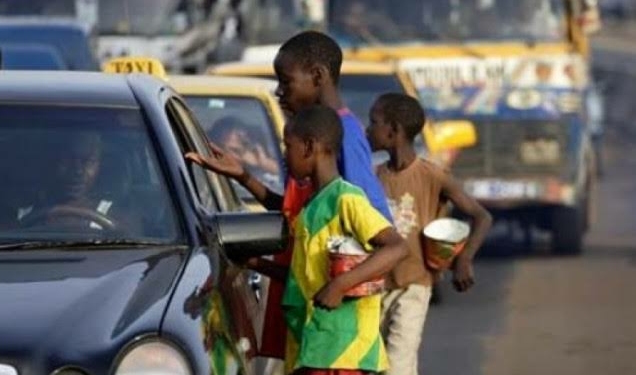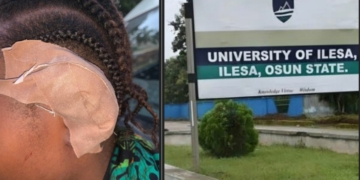“If you don’t work in life, you will not have access to money you can spend. While the strong continue working to survive, the lazy one is busy sleeping. Aside from the fact that we must give, the lazy ones cannot borrow money, if he’s borrowed some funds, the lazy one would not be able to refund it.” This was the response of popular Fuji artist Saheed Osupa to the late Chief Sikiru Ayinde Barrister at an event organised by Music promoter, Bayowa Films and Records. Late Sikiru had earlier sung that hardship cannot kill a child who can work, but hunger can kill a lazy child.
Yorubas really detest alm-seeking. They have several names, like ‘Oledarun’ to portray lazy people who do not want to work but prefer to rely on other people’s sweat for survival. In fact, they strongly believe that there is no pride in begging, and any individual who seeks alms should be given a cutlass, a hoe, and a basket for farming. Alms-seeking is now at an alarming rate particularly the use of kids to lure money from persons.
This report not only shows how some individuals have turned to alms-seeking to feed their loved ones, but it also shows how some parents use their innocent kids to lure money from people in public places like garages, eateries, supermarkets, and police stations, among others.
It also reveals that most parents have found succor in alms-seeking, and they see their kids as potential weapons to engage in such activity without considering the dangers they are exposing them to.
WITHIN NIGERIA journalist, SODIQ LAWAL CHOCOMILO visited some popular places like eateries and supermarkets and interacted with some beggars, particularly kids, in Ilesa, a town in Osun State, as a case study for the research. In the report, some socio-political analysts expressed their concerns about the development and equally advised the government on ways to solve the menace.
On a Saturday evening around 6:15 p.m., I embarked on visitations to public spaces like supermarkets, eateries, and fuel stations, among others, to interact with kids or parents who are into alms-seeking. I had highlighted five places, namely, two eateries, two supermarkets, and one filling station.
I went to Akewusola Chemist and Supermarket, located along Okesa Road in Ilesa, to buy some drugs. The moment I stepped out of the store, I was approached by two kids, averagely 7–8 years of age, who begged for money and lamented that they had not eaten since morning. I gave each of the kids the sum of N200. I had pocketed twenty notes of N200 from home before the commencement of my findings.
As I was leaving the spot, deeply concerned about the hardship and hunger that have overwhelmed the masses, I observed that these kids walked towards a partially destroyed building due to the ongoing dualization of the Roundabout to Brewery Expressway junction by the Osun State Government. When I moved closer to the building, I saw a woman in her forties who was struggling with a wrapper she used to carry a baby on her back.
She felt surprised by my presence. She hurriedly packed her things, held the hands of her kids, and left the place. I did not go after her because there’s a major road in front of the building and a minor road at the back of the building. I do not want a situation where a moving vehicle would hit either the nursing mother or her kids while running after her.
I left the chemist store and trekked down to an eatery identified as Bitemore, which is located at Enu-Odi, a popular junction along Okesa Road. I entered the eatery around 6:45 p.m., bought a loaf of bread, and left there. Two young girls approached me as I was leaving the premises and begged that I should give them money to buy food because they’d not eaten since morning. I gave them a note out of the eighteen notes of N200 with me. They walked towards a woman who should be in her late thirties, and they gave her the money.
Unlike the other woman, she did not run away while I approached her. I gave her two notes of N200, making N400, which allowed me to initiate a conversation with her. What happened? Why are you begging for money? Why are you using your kids to beg for money? I calmly and quietly asked her. I thought she would pack her things and leave the spot, but she kept quiet for a while and later responded that hunger caused it. Hunger, I exclaimed. Don’t you work? I asked again. She told me that she washes clothes and cleans houses for people in return for money, food, or clothes.
According to the woman, the money given to her for service rendered could not sustain her family of three, and she had no choice but to beg for alms since she cannot steal. She further claimed that people no longer give her jobs, and those who give her jobs do not pay her well.
When I asked about her husband, she told me that he died in a fatal motor vehicle accident two years ago. She added that the family of her late husband abandoned her and the kids. She broke into tears, and I was consoling her when I saw her kids running to a man who wore an Ankara native dress and was carrying a nylon bag. The woman also stood up and walked quickly to the man. They did not return to their spot again. They trekked some meters and entered one building in Igbaye, a street in Ilesa.
I followed the route they took, but I got lost because I could not get to the particular building they entered. I approached a man probably in his late forties who sat beside another woman selling ‘fufu’ about the whereabouts of the family. He scornfully laughed and asked if they did not dupe me. The man, who later identified himself as Kolapo, disclosed that the action of the family is not new to him because they have been doing it for a long time.
“I do not know their house, but they usually come here to beg for money,” Kolapo revealed as he pointed to a shed where husband and wife stay while they send their young girls to go and beg for money from people”.
“This is not the first time they would run away from someone. I can count two people they’ve run away from. They have gone to another location to seek alms. They believe their secrets have leaked out to you, and that’s why they ran away. It would take some weeks before you see them here,” Kolapo further revealed.
According to Kolapo, they have turned it into a family business.
I left ‘Bit More’ eatery around 8:00 p.m. and moved down to another eatery, ‘Tasteful Kitchen’ situated beside the popular Odo-Oro garage. I had already seen beggars, particularly those with disabilities, sitting on the cement block on which the fuel tank is positioned in front of the eatery. I entered the eatery and waited for a couple of minutes before I left.
As I stepped out of the eatery, two young boys approached me to beg for money, and I intentionally shouted at them. They walked away from my sight to meet another set of people leaving the eatery. As I walked towards the main road, I saw a woman, probably in her mid-forties, who sat at the edge of the premises with a baby in her arms and another child sitting on the bare floor and pointed in my direction to a young girl. I could not grasp what she told her, but I noticed that the girl was moving closer to me. I deliberately reduced my pace, and the girl touched me from behind and begged that I should give her money.
The young girl said she had not eaten since morning. I gave her two notes out of the remaining 200 notes with me. She was about to leave my side when I grabbed her. The purpose of grabbing her was to use her to apprehend her mother, who was using her as an exploitative tool. As I grabbed the young girl, her mother had sighted us from afar. The moment she noticed that I was coming to her side, she grabbed a black nylon bag and crossed to the other side of the road. She left her child and absconded. It was already 8:32 p.m. I did not want to leave the girl because she could go missing if she decided to run away. I also did not want the woman to run away, leaving me with her girl at such an odd time. I also averted a situation where she could be hit by a moving car or motorcycle while I was chasing her.
I had to release the young girl immediately when her mother absconded. The girl waited for some minutes before she crossed the road to meet her mother. They sat in front of a closed shop that was not far from the eatery. I waited for some minutes to track them to their house, but they did not move an inch. They stood still. I left the eatery to stay at a fuel station belonging to Total. The mother and her girl had already left before I got back to the eatery. I looked everywhere, but I could not find them. I asked around, but no one could identify or trace them to their respective houses.
Growing rate of alms-seeking among children is disturbing
An Osun-based lawyer, Chidera Eze, stated in a telephone conversation with WITHIN NIGERIA that it is disturbing and disheartening to see children who should be in school or learning one good vocational skill begging for peanuts while their parents are at home, and in most cases, they go along with their parents, especially their mothers.
According to Eze, the state government should pick up such a child, and the parents of such a child should be arrested.
The lawyer also urged the state government to establish an agency to take full charge of the feeding, schooling, and well-being of such children.
He further added that the government should set up mini-businesses through the provision of grants to parents of kids whose cases are genuine after proper examination.
Begging, a sign of decadence to Yoruba culture
An elderstateman and a former Head of Service in Osun, Segun Akinwusi, while reacting to the issue, said that alms-seeking or begging is an aberration and a sign of decadence to the culture.
Elder Akinwusi told us within Nigeria that poverty and the associated suffering should be an immediate concern for everyone in our region.
“We are at a crucial stage in the affairs of Yoruba land today that requires our leaders to have a serious introspection about what the future portends for our race. Hunger should be the least challenge to us as a people because God has blessed us with good land and in sufficient quantity to meet our needs,” he further stated.
While thanking the newspaper publication for extending torchlight to this sad development, he disclosed that part of what should attract our attention is even the size of our individual families.
What does a large family mean without adequate resources to take good care of ourselves? The elder statesman queried.
Akinwusi urged the government to look for ways and means to empower all able bodies, especially the youth.
“Our educational system also needs a revisit to produce useful, non-dependent graduates. The culture of looking after the elderly should be encouraged because our economic system does not allow for making the elderly live longer.”
“Begging, opening, or otherwise should be discouraged, and the way to do so is not to continue the present feudal system of giving fish to the people without helping them to fish for themselves.”
Akinwusi, who cited that Awolowo did not restrict education to the children of kings and nobles, also implored the government to make education free and available for all.
“Politicians should make their dividends of democracy by rewarding their friends and associates only.”
Children are alms-seeking, a violation of child rights law
A teacher of law identified as Dr. Misbau Alamu Lateef stated that the issue of child begging in Osun State, particularly given the recent incident in Ilesa, is a concerning trend that violates fundamental human rights and child rights laws.
The law teacher who cited Section 34 of the 1999 Constitution of Nigeria guarantees the dignity of every person, including children.
He further stated that the Child Rights Act of 2003 explicitly prohibits the exploitation of children for alms-seeking or begging.
He told WITHIN NIGERIA that the issue, beyond the legalese, reflects deeper socio-economic challenges and a failure of social welfare systems in Nigeria.
“Therefore, it is imperative for the Osun State government to enforce existing laws and implement comprehensive social programs to address poverty, improve access to education, and provide support for vulnerable families in our communities in Osun,” he opined.
“Furthermore, the affected local government areas and traditional institutions should collaborate with NGOs and other stakeholders to raise awareness about the harmful effects of child begging and develop alternative means of support for affected persons and families.”
Ultimately, tackling this issue requires a multi-faceted approach that balances law enforcement with social intervention to protect children’s rights and the dignity of human beings, he added.




Discussion about this post